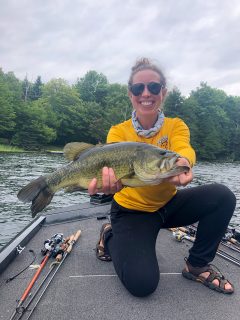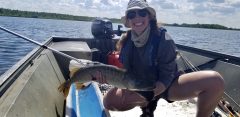––The following story was written by Taia Goguen-Garner.
As many recreational anglers may know, gill injuries happen. But what should one do about it?
 Alexandria Trahan, an MSc candidate from the Department of Biology, is researching potential strategies for addressing bleeding injuries in angled fish.
Alexandria Trahan, an MSc candidate from the Department of Biology, is researching potential strategies for addressing bleeding injuries in angled fish.
In 2018, Trahan was in a field course where she learned about fisheries science field work. She realized that she could turn her love for angling into a degree and a future career.
Explained Trahan: “I loved all the research that came out of Dr. Cooke’s lab and was eager to work with people who loved fish, conservation and ecology as much as I did.”
Biology Professor Steven Cooke has been mentoring Trahan throughout her research.
Trahan hopes that her research will provide answers to questions anglers may have about their practices on the water.
“There are a lot of different beliefs in the angling community as to what the best practices are to ensure that the fish return to water in the best shape possible and I’m just hoping to clarify some uncertainties and add to the conversations anglers are having,” shared Trahan.
 Trahan has recently completed one of the chapters of her thesis where she investigated if carbonated beverages reduced bleeding in gill injuries of angled Northern Pike. This was not a random research question but rather something that is touted by many anglers as a panacea. Yet, there was no scientific research on whether carbonated beverages poured on bleeding fish actually had any benefit.
Trahan has recently completed one of the chapters of her thesis where she investigated if carbonated beverages reduced bleeding in gill injuries of angled Northern Pike. This was not a random research question but rather something that is touted by many anglers as a panacea. Yet, there was no scientific research on whether carbonated beverages poured on bleeding fish actually had any benefit.
“We found that there were no benefits of using these beverages and they are more useful to the angler than to the pike,” explained Trahan. “It’s best to simply ‘Keep Fish Wet’ and return them to the water. A possible way to prevent gill injuries is to change the hook type on the lures that anglers use in the first place. This is what the other chapter of my thesis will be focusing on. Results are to come soon!”
For Trahan, graduate studies have given her a confidence in academia and in science that she did not experience throughout her undergraduate degree in Biomedical Sciences.
“My research is something I am extremely proud of and has given something that allows me to say, ‘I did that, from beginning to end’,” said Trahan. “Despite it being extremely difficult at times, I have made incredible connections, friendships and have grown as a student, professional and person.”
Trahan has been working out of the Cooke Lab.
“Dr. Cooke has been a rock and a great role model throughout my research,” expressed Trahan. “He has helped my writing immensely, my confidence in my research and has encouraged me throughout all the highs and lows of grad school. I am very fortunate also to be mentored by incredible women in my lab. As a woman in STEM, I have had the pleasure to look up to other female researchers. My lab mates have also made field work and graduate studies at Carleton a blast!”
Trahan hopes to publish both chapters of her thesis and share her findings with as many anglers as possible. Given angler interest in these topics, her findings have already been featured in fishing magazines and on angling websites.
Said Trahan, “I would love to continue studying different ways catch and release angling could be refined to ensure that more fish survive long term after returning to the water.

Monday, October 19, 2020 in Grad Student Research, News
Share: Twitter, Facebook



